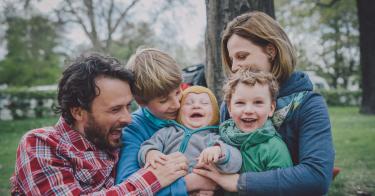When I was 9 years old, my parents separated and then divorced. When I was 15, I announced to my mother that I no longer would go to church.
Apparently, in doing so, I was living out a common phenomenon. As marriage declines, so does religious belief, John Van Epp and J.P. De Gance point out in their new book “Endgame: The Church’s Strategic Move to Save Faith and Family in America.” This is not merely a psychological issue, the authors argue, but a deeply spiritual one.
Marriage is central to both the Christian and Jewish faiths: Scripture begins with the marriage of Adam and Eve and ends with the marriage of Christ and his bride, the church.
In the Old Testament, marriage is used repeatedly to symbolize God’s love for his people, the Jews.
In the New Testament, marriage is a symbol of Christ’s relationship with the church. Paul, in Ephesians 5:25, commands: “Husbands, love your wives, even as Christ also loved the church, and gave himself for it …”
Yet the majority of churches in the United States seem to believe that the work of building and maintaining healthy marriages is best left outside the church. The authors of “Endgame” estimate that churches spend as much as $4 billion to $6 billion on youth ministry, but spend only a fraction of that on marriage or relationship ministry.
>>> Why the Declining Marriage Rate Affects Everyone
Three out of four churches do not provide relationship classes or resources for married couples, and more than 90% of churches do not offer a ministry for single adults. At the same time, the number of Americans who say they belong to a religious body has dropped precipitously in the past 20 years alone—from 70% in 2000 to 47% today.
“In the fight for faith and family in America,” the authors argue, “we have reached the endgame.”
De Gance and Van Epp make an airtight case for why the church must radically change its thinking about its role in nurturing and supporting the family. Not only must the church engage in the recovery of marriage if it is to survive, but there is also a pastoral imperative: Americans feel lonely and isolated on an epidemic scale, and generational loneliness is worsening.
Depression, anxiety, and suicide have risen dramatically. Loneliness is not the only problem: Sex and parenthood outside marriage have led to a whole array of ill effects, including abortion, the spread of sexually transmitted diseases, a rise in poverty levels, and behavioral problems.
As Patrick Fagan wrote back in 2001 in a report for The Heritage Foundation: “Throughout the social science literature, we find an ever-present correlation between a breakdown in the family and increases in child poverty, juvenile delinquency, child abuse, poor academic performance, addictions, and health problems.”
The good news, as De Gance and Van Epp point out, is that the church has a record of stepping up in the midst of civilizational crises: When plagues ravaged the world, Christians created hospitals. When the barbarians invaded the West, monasteries preserved Holy Scripture as well as the works of the ancient world.
Christians formed the backbone of the abolition movement to combat slavery, and it was Christian Sunday schools that helped America abolish illiteracy in the second half of the 1800s.
The question now is whether pastors and priests will step up and take on this critical task.
If ever there were a set of circumstances that could powerfully and viscerally underscore the value of family and healthy relationships, it has been the COVID-19 pandemic. Although the decline of the family has been underway for decades, our confinement to home in the past year and a half has been a wake-up call.
De Gance and Van Epp have built a powerful case, grounded in data and tested through experience, for how churches can step up to help us heal relationships and restore the family as the cornerstone of both individual and civilizational health.
This piece originally appeared in The Daily Signal



